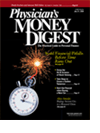Portfolio CHECK-UP
Name: Jim Bates, MD
Residence: Georgia
Age: 37
Family:: Married; two children
Years in practice: 4
Specialty: Surgery
Annual income: $450,000 (Joint income in 2003)
Savings: None specified
Financial concern: Dr. Bates and his wife Kim, a corporate attorney, areconsidering purchasing their first home. As interest rates are starting to slowlyrise, they think that now is probably an advantageous time to lock in a reasonableinterest rate on a fixed-rate mortgage. In addition, they are consideringtaking a relatively large mortgage, as the interest portion of the mortgagepayment is a tax-deductible expense. Dr. Bates is concerned with how much heshould put down toward the home purchase and if he should finance the balancefor 15 or 30 years.
The Finance Professor's Solution
From a purely economic perspective, it is more advantageous in this currentinterest rate environment for Dr. Bates to finance more of the home purchaseusing someone else's money (ie, the mortgage lender's) over a longer period oftime. Dr. Bates is in the high 35% tax bracket and has the annual contributionhe is currently making toward his retirement plan as his only deduction.
For example, on a $400,000 mortgage, the monthly principal and interestpayments would be approximately $3322 for a 15-year fixed rate at 5.75%and $2463 for a 30-year fixed rate at 6.25%. In other words, if he pays off themortgage in 15 years instead of 30 years, his monthly mortgage payment willbe increased by $859, but, over the life of the loan, he will save nearly$289,000 in mortgage interest. However, this does not necessarily make thebest sense from an economic perspective.
Suppose Dr. Bates remains in the 35% tax bracket until he retires. Becausethe mortgage interest is tax-deductible, the after-tax cost of the loan is 3.74%on the 15-year mortgage and 4.06% on the 30-year mortgage. Therefore, ifDr. Bates took out the 30-year mortgage and made a conscious effort to investthe monthly difference of $859 in a tax-deferred vehicle that was protectedfrom creditors and earned a rate of return that exceeded the after-tax cost ofhis mortgage loan, he would be further ahead of the game in the long termthan if he used more of his own money toward a larger down payment andfinanced the difference over a shorter period of time.
For more information, call Mr. Kosky at 800-953-5508or visit www.assetplanning.net.
Thomas R. Kosky and his partner, Harris L. Kerker, are principals of the AssetPlanning Group in Miami, Fla, specializing in investment, retirement, and estateplanning. Mr. Kosky teaches corporate finance in the Saturday Executive andHealth Care Executive MBA Programs at the University of Miami.
